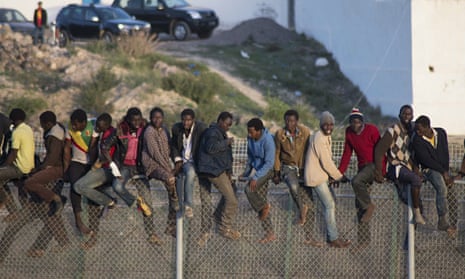International efforts to tackle poverty must resist the temptation to go for “the low-hanging fruit” and focus instead on protecting and promoting the fundamental human rights of migrants, a UN special rapporteur has warned.
In a blunt report to the UN general assembly on Friday, François Crépeau, special rapporteur on the human rights of migrants, said the millennium development goals (MDGs) had served to widen inequalities and had been viewed by some governments as an agenda for economic growth rather than a means of improving human rights.
“The goals encouraged technical fixes and focused on the low-hanging fruit, rather than targeting the root causes of development problems,” he said.
“Consequently, they monitored progress and success through a one-size-fits-all lens, focusing only on what was easily measurable and not on what was important, such as the empowerment of marginalised groups. The lack of proper monitoring meant that it was difficult to hold governments accountable at the global, national and local levels.”
By “delinking” the MDGs from human rights commitments, said Crépeau, the framework had, in effect, reduced state obligations to little more than policy options.
He added: “Although equality was one of the core values of the UN millennium declaration, the goals did not adequately tackle issues of discrimination, equality and equity, resulting in increases in inequalities within and between countries. The goals placed emphasis on overall progress as the main indicator, thereby overlooking slower progress or the growing exclusion of marginalised groups, including migrants living and working in precarious circumstances.”
But Crépeau argued that human rights were essential for development and must not be sidelined as the UN prepares to debate the sustainable development goals (SDGs), which will replace the MDGs at the end of next year.
“The post-2015 sustainable development goals are an opportunity for governments to show their commitment to human rights; that they are indeed indivisible and applicable to all regardless of one’s immigration status,” he said.
He called on countries worldwide to ensure that the human rights of migrants were given a proper place in the SDGs, saying that much of their MDGs’ progress had been achieved through the hard work of men and women who had left their homes to seek work abroad.
Crépeau noted that, in 2013, migrants sent about $404bn (£251bn) in remittances, and also pointed out that those moving from less developed to more developed countries achieved a fifteen-fold increase in income, a doubling in education enrolment rates, and a sixteen-fold reduction in child mortality.
“If the human rights of migrants, regardless of their status, are effectively promoted, respected and protected within well governed migration processes, such development outcomes can be greatly enhanced,” he said.
However, he added that many states were still failing to protect the most vulnerable in their societies, with some sanctioning industries – such as construction, hospitality, extraction, fishing and agriculture – that exploited migrants as a source of cheap labour.
“Such migrants experience multiple forms of discrimination, on the basis of nationality, legal status, sector of work, sex, age and ethnic, linguistic or religious identity,” he said.
“Development targets that pay no attention to which groups are being left behind can be met without having any real impact on ensuring a more equal and just world. The focus should not be on simply reducing the cost and increasing the flow of remittances, but rather on the human cost of migration.”
